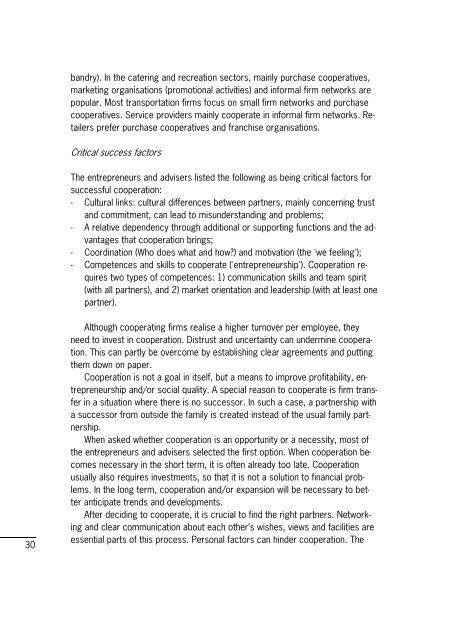2009-082 Samen werken aan samenwerking - Lei
2009-082 Samen werken aan samenwerking - Lei
2009-082 Samen werken aan samenwerking - Lei
Create successful ePaper yourself
Turn your PDF publications into a flip-book with our unique Google optimized e-Paper software.
30<br />
bandry). In the catering and recreation sectors, mainly purchase cooperatives,<br />
marketing organisations (promotional activities) and informal firm networks are<br />
popular. Most transportation firms focus on small firm networks and purchase<br />
cooperatives. Service providers mainly cooperate in informal firm networks. Retailers<br />
prefer purchase cooperatives and franchise organisations.<br />
Critical success factors<br />
The entrepreneurs and advisers listed the following as being critical factors for<br />
successful cooperation:<br />
- Cultural links: cultural differences between partners, mainly concerning trust<br />
and commitment, can lead to misunderstanding and problems;<br />
- A relative dependency through additional or supporting functions and the advantages<br />
that cooperation brings;<br />
- Coordination (Who does what and how?) and motivation (the 'we feeling');<br />
- Competences and skills to cooperate ('entrepreneurship'). Cooperation requires<br />
two types of competences: 1) communication skills and team spirit<br />
(with all partners), and 2) market orientation and leadership (with at least one<br />
partner).<br />
Although cooperating firms realise a higher turnover per employee, they<br />
need to invest in cooperation. Distrust and uncertainty can undermine cooperation.<br />
This can partly be overcome by establishing clear agreements and putting<br />
them down on paper.<br />
Cooperation is not a goal in itself, but a means to improve profitability, entrepreneurship<br />
and/or social quality. A special reason to cooperate is firm transfer<br />
in a situation where there is no successor. In such a case, a partnership with<br />
a successor from outside the family is created instead of the usual family partnership.<br />
When asked whether cooperation is an opportunity or a necessity, most of<br />
the entrepreneurs and advisers selected the first option. When cooperation becomes<br />
necessary in the short term, it is often already too late. Cooperation<br />
usually also requires investments, so that it is not a solution to financial problems.<br />
In the long term, cooperation and/or expansion will be necessary to better<br />
anticipate trends and developments.<br />
After deciding to cooperate, it is crucial to find the right partners. Networking<br />
and clear communication about each other’s wishes, views and facilities are<br />
essential parts of this process. Personal factors can hinder cooperation. The

















